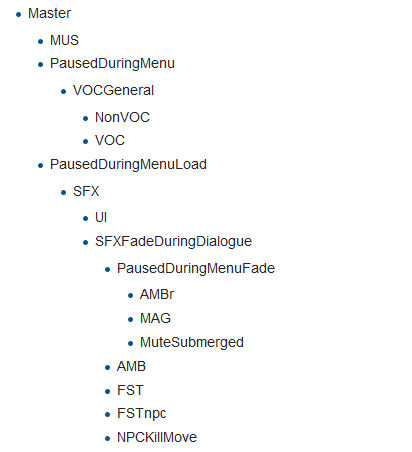Difference between revisions of "Arcane University:Sound Effects"
(→Tool-specific Guidelines and Links) |
(→Implementation: changing to ck.uesp.net link) |
||
| (3 intermediate revisions by 3 users not shown) | |||
| Line 1: | Line 1: | ||
| + | {{Trail}}{{AUDisciplines}} | ||
This is the main page of the Beyond Skyrim Arcane University Sound Effects tutorials. | This is the main page of the Beyond Skyrim Arcane University Sound Effects tutorials. | ||
| Line 21: | Line 22: | ||
* Sound Output Model | * Sound Output Model | ||
| − | see: https:// | + | see: https://ck.uesp.net/wiki/Category:Audio |
=== Mastering the Sound File === | === Mastering the Sound File === | ||
| Line 39: | Line 40: | ||
* https://www.audacity.de/ | * https://www.audacity.de/ | ||
* https://www.musicradar.com/news/the-bbc-is-letting-you-download-more-than-16000-free-sound-effect-samples-from-its-archive | * https://www.musicradar.com/news/the-bbc-is-letting-you-download-more-than-16000-free-sound-effect-samples-from-its-archive | ||
| + | * https://sonniss.com/gameaudiogdc18/ | ||
[[Category:Arcane University]] | [[Category:Arcane University]] | ||
| + | [[Category:Arcane University-Sound Effects| ]] | ||
[[Category:CK_Audio]] | [[Category:CK_Audio]] | ||
Latest revision as of 17:03, 20 December 2024
| 3D Art |
| Animation |
| Concept Art |
| Implementation |
| Level Design |
| Music Composition |
| Project Management |
| Sound Effects |
| Voice Acting |
| Writing |
This is the main page of the Beyond Skyrim Arcane University Sound Effects tutorials.
Contents
Expectation[edit]
A sound engineer can create acoustic spheres and ambients, which make the world the player journeys through directly experienceable.
General Workflow & Format[edit]
Implementation[edit]
- The Creation Kit knows certain sound categories, which are playing according an hierarchy. Higher hierarchy sounds duck (mute or lower volume of) lower hierarchy sounds.

In the Creation Kit, you can find these sound objects to work with as implementer:
- Acoustic Space
- Music Track
- Music Type
- Reverb Parameters
- Sound Category
- Sound Descriptor
- Sound Marker
- Sound Output Model
see: https://ck.uesp.net/wiki/Category:Audio
Mastering the Sound File[edit]
For music, you have a choice of quality - 192kbit XWM, or WAV's that have not been re-encoded. There's a huge quality difference between either choice and vanilla music, easily perceptible and borne out by ABX (blind comparison) testing - I had 99.95% confidence results that I could correctly identify each file (100% accuracy). I'll be putting up some comparison files at some point.
My own ABX testing of the 192kbit XWM vs the WAV's gives results below statistical significance (74% confidence), though obviously this may vary according to your own ears and audio equipment, so the files are there if you want them. If in doubt, just go for the 192kbit XWM's, they are a huge improvement over vanilla and do not use the extra 3GB of space needed for the WAV's.
The voices only come as one encoding option, 192kbit XWM's - WAV's would both be far too large (25-30GB) and couldn't be packed into .fuz files with lipsync data. Again, ABX testing against the vanilla files gave 99.95% confidence of perceptible difference between vanilla and the mod. These have been carefully level matched to within 0.2dB of the original vanilla voices - so they will fit fine with any mod-added voices based on vanilla volumes. 1dB is generally regarded as the limit of perceptible volume difference for humans, so any difference should be imperceptible.
The original Vanilla files are 44.1kHz at 48kbit XWM files. UHDAP's files are 48kHz 192kbit XWM files. WAV Music is lossless PCM conversion from the PS4 AT9 compression (so not re-compressed in any way)